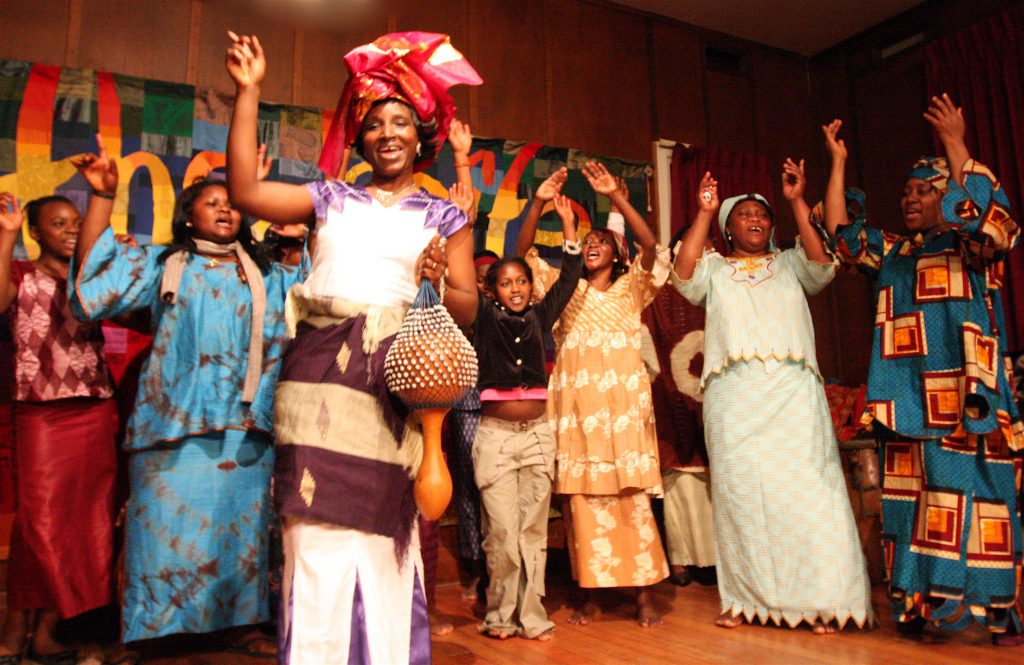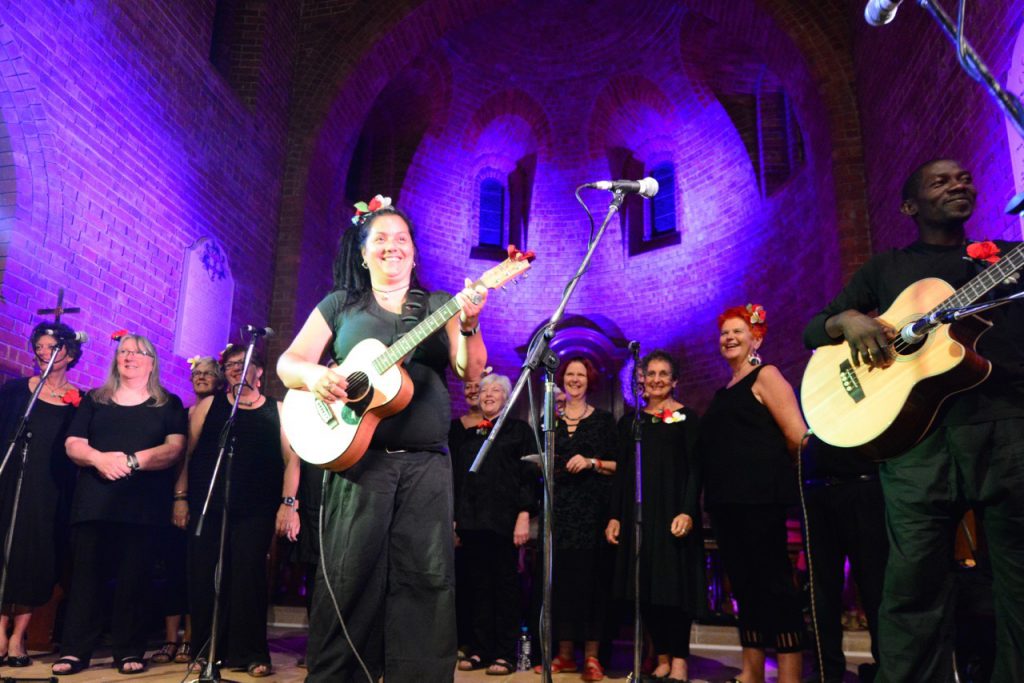2010 saw The Boîte continue working to support the development of local artists through a significant community development music project. This time in partnership with The Victorian Foundation for Survivors of Torture, The Boîte supported the development of Kankelay, Sierra Leonean Women’s choir as an exercise in healing and cultural expression. The Boîte then brought the choir to the Daylesford Singers Festival in January, and again the following year, where the group performed and shared their skills through workshops with festival-goers. The partnership continued beyond the festival, to encompass assisting the group to develop a theatrical play about the experiences that brought the women to Australia and the challenges of resettlement.

Through another partnership with Foundation House, The Boîte also worked with members of the Karen community from Burma to further develop musical performances drawing from traditional and contemporary Karen culture. Following five months of workshops and development sessions with members of the Karen community in Melbourne’s west, the project culminated in 80 members of the community performing at the Wyndham Refugee Week Concert to an audience of 400 people. Stemming from the project, several young members of the community went on to perform at The Boîte World Music Cafe in North Fitzroy.
‘Mai Fali Eh’ means ‘come home’ in Tetum, the most commonly spoken language in Timor-Leste. In 2012, The Boîte embarked on a groundbreaking community engagement program with members of the Timorese communities in both Timor-Leste and Victoria, as well as the Australian Timor-Leste friendship network of Australia, to develop the Mai Fali Eh! project.

The project was developed with guidance and support from Timor-Leste musician and community leader, Ego Lemos, whose first experience of touring in Australia had been with the Millennium Chorus in 2001. The project involved Timorese choir Koru Loriku, coming to tour Victoria and perform with the annual Melbourne Millennium Chorus and Boîte Schools Chorus program. The Koru Loriku choir (named after the lorikeet, a bird that Australia and Timor-Leste share) involved singers drawn together from all the language groups in Timor-Leste, with support from Ego Lemos and Choir Director Paulo Pereia Dos Santos. The initiative involved Boite staff Roger King and Katrina Wilson travelling to Timor-Leste to support the establishment of the project and significant work from The Boîte in supporting the choir members to later tour Victoria.

Mai Fali Eh! enabled thousands of participants to share in the languages, stories and culture of Timor-Leste and engaged Timorese friendship groups from both Australia and Timor-Leste. Millennium Choir members performed draped in hand woven tais, commissioned from weaving co-operatives in Timor-Leste, designed for the event.

In 2013, The Boîte embarked on a new adventure – a partnership with artist Stella Savy to launch a cultural touring program, taking 19 singers to the Seychelles for three weeks. The music and culture of the Seychelles were explored through the 2013 Millennium Chorus and Schools Chorus production of Coco de Mer, under the artistic direction of Stella Savy and Dani Fry.
Hear the 2013 Millennium Chorus perform Kultur live at the Coco de Mer concert on Sunday 4th August 2013. Kultur was written and arranged by Stella Savy, to acknowledge the importance of keeping Seychellois Kreol culture alive.The cultural tour offered an opportunity for choir members to delve deeper, and experience the Seychelles themselves, with tour guide Stella Savy sharing her Seychelles Island heritage. The interest of The Boîte in local musical culture encouraged further cultural development activities within the Seychelles.
In 2014, the Boîte Millennium Chorus returned to Hamer Hall (the site of the inaugural performance in 1999), with Gurrong – New Treasures in an Old Land. Under the artistic direction of Jane Thompson and James Rigby, the concert featured a choir of almost 400 members whose performance inspired Jane Thompson to say:
‘Taking ordinary singers and expecting them to present extraordinary performances is powerful and moving – and it works. It reflects the Boîte’s enduring philosophy – empowering people to sing is empowering in itself. The act of singing in one voice is transformative.’
In front of a backdrop of projections of the art of Gail Mabo, the guest artists shared stories and songs about this ancient land where the oldest living cultures are found, and about the experience of coming to this land as a migrant. As described in The Boîte Annual Report, audience members heard ‘Archie Roach imploring us not to forget the vulnerable, Freydi Mrocki and Ernie Gruner sharing the stories of their families’ arrival here, stories echoed in Shane Howard’s song about his grandmother’s migration from famine ridden Ireland.’

Local Arabic and Jewish musicians came together to perform in Under the Olive Tree, a unique concert event presented by The Boîte at the Immigration Museum. The realisation of a long-held dream of Israeli born cellist Adi Sappir, the concert was developed through a two-year process of dedicated planning with Adi and a partnership with the Immigration Museum. As Therese Virtue of The Boîte described:
‘Under the Olive Tree enabled us to bring together performers separated by cultural, geographic and social factors in the vast spread of Melbourne, and to set up artistic collaborations which exploited commonalities in Arab and Jewish music older and more integral than current political divides.’
On the 1st of June 2019 – 40 years to the day that the first Boîte concert was hosted in Melbourne in 1979 – around 600 people came together for a special musical event to celebrate this milestone birthday. Hosted in the Sacred Heart Courtyard at the Abbotsford Convent, the home of the Boîte since 2016, the concert featured performers with both a historic association with The Boîte as well as newly arrived artists.
Alejandro Vargas, original member of Andean folk band Apurima who performed at the first Boîte concert, provided a beautiful accompanying guitar to his daughter Tash’s vocals. Other artists drew on musical traditions as diverse as Greek, West African, Japanese, Balkan Brass, Chilean, Latin American, Persian and Klezmer violin.
